The 2001 Children's Health - Cycling stamps celebrated a form of exercise beneficial to children, no matter what their circumstances. Cycling is an ideal antidote to sedentary lifestyles, which may explain why it has been amongst New Zealand's top 10 favourite pastimes.
Issue information
It's easy to understand the appeal of the bicycle. A bike is practical, efficient, cheap, healthy and easy on the planet. But most of all, it's fun. All around the world, the bicycle has been rediscovered and promoted as a means of reducing traffic congestion, and improving the environment and people's health.
In New Zealand, in the past, cycling has enjoyed a boom fuelled by mountain bikes. The emergence of the mountain bike made it possible for cyclists to venture into areas previously inaccessible to wheeled transport. It attracted thousands of people back into cycling, and introduced thousands more to the joy of exploring on two wheels.
The bicycle is a vehicle for our times – quiet, non-polluting, healthy, economical, convenient and fun.
As H. G. Wells put it, "When I see a person on a bicycle I have hope for the human race."
Miniature Sheet
Both gummed stamps were featured in the miniature sheet. This sheet was presented in a round bicycle wheel die-cut featuring cycle spokes, in keeping with the overall theme of the issue.
Choice of First Day Covers
The Children's Health 2001 issue included two first day covers. The cover portraying the two young cyclists on the beach has the die-cut miniature sheet affixed.
The other first day cover in the series portrayed a cyclist and his dog. It featured the complete set of stamps.
Stamp Sheetlet
The sheetlet featured ten 40+5 cent Family Time gummed stamps with a red selvedge.
40+5c Carton
The 40+5 cent self-adhesive Out Riding stamp was available in dispenser boxes of 100, ideal for anyone who used mail regularly.
How Health Stamps Help Children's Health Camps
Thousands of children from disadvantaged or difficult home environments enjoy 'time out' in one of New Zealand's seven Health Camps every year. And since 1929, ordinary New Zealanders and collectors here and overseas have lent a hand in buying Health stamps.
One again, you could support this work, and enjoy a colourful new series of photographic stamps, with the 2001 Children's Health issue.
The extra 5 cents applied to each of these stamps went directly to the support of Children's Health Camps.
A Tradition of Healthy Living
For decades, Health Camps have provided a caring, supportive and healthy environment where children learn to manage their own health needs, can be helped to develop social skills and build peer relationships.
Children take part in a range of programmes developed to meet specific needs, from personal health care and safety to exploring ways of using leisure time.
Each camp also has a school attached, where children get special support help with their learning. Small classes and tailored programmes help them escape personal stresses and begin to feel positive about learning and themselves.
Parent education training in the camps supports work with children, helping ensure the benefits are spread as far as possible into the community.
Product Listing for 2001 Children's Health - Cycling
| Image | Title | Description | Price |
|---|---|---|---|
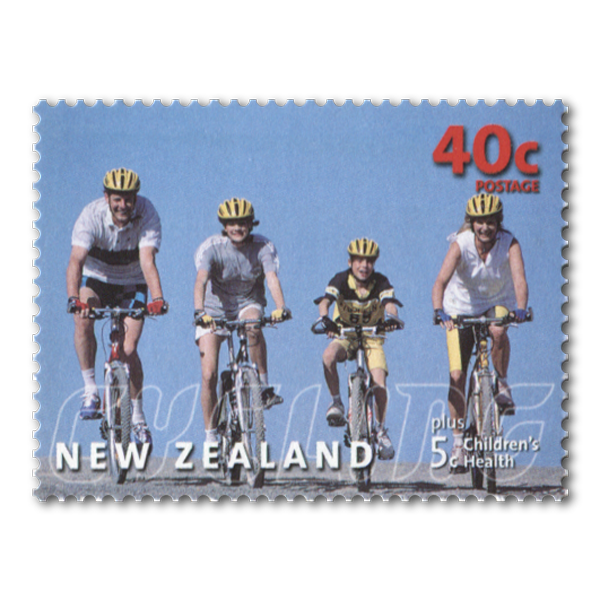 |
Single Stamp |
Single 40c + 5c 'Family Time' gummed stamp. Teaching a child to ride a bike is a milestone event in the life of a family. For the child it is an opportunity to develop self-esteem and independence. For the parent it is a way to teach safe riding skills. For the family it is a chance to share quality time. Biking as a family sends a strong message that exercise is a part of a healthy lifestyle. It helps to develop co-ordination, strengthens muscles and builds cardiovascular fitness. It strengthes the senses and it teaches that if you put an effort in, you will get something back. Mountain bike parks aroung New Zealand are excellent places for children to practise their biking skills. Heading down to the park for a picnic, dropping by the swimming pool, or even going on holiday and taking bikes along all allow for the family to exercise together. |
$0.45 |
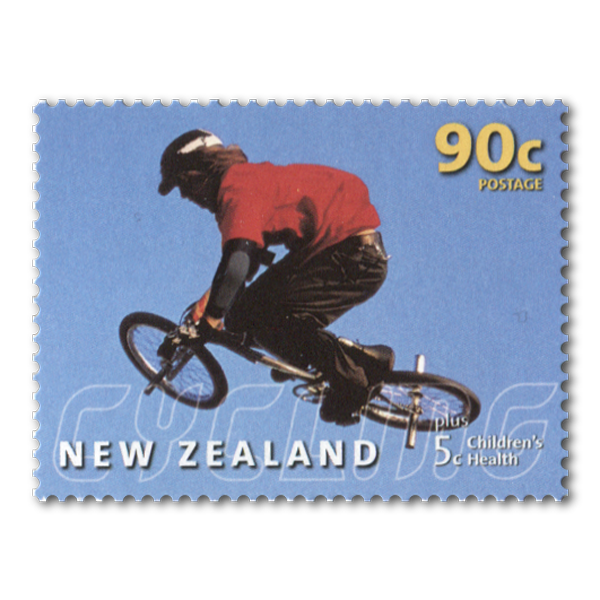 |
Single Stamp |
Single 90c + 5c 'Catching Air' gummed stamp. Within a few years of arriving in New Zealand in 1977, BMX - Bicycle Motocross - was out of control. The timing was perfect – the major craze of skateboarding was waning and Kiwi kids were ready for something new. Local bike manufacturers soon had trouble keeping up with demand. At race meetings more than 500 kids, with parents in tow, created a chaos to challenge most event organisers. Around the country, purpose built circuit race tracks with starting ramps, jumps, bumps and berms were developed. Before long, some riders began to look for alternatives to competitively racing around the short BMX tracks. It was natural for growing kids to look for more skillful challenges. BMX bikes were modified by adding front brakes and foot pegs to the front and rear axles. This enabled riders to master a range of mindboggling feats, including hopping over obstacles, spinning the bike around on the front or rear wheel, wheelies, table tops, cross-overs, and even somersaulting off ramps. |
$0.95 |
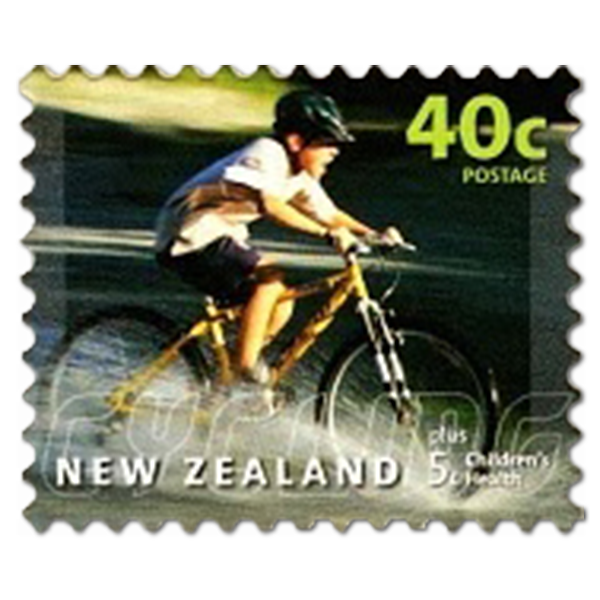 |
Single Stamp |
Single 40c + 5c 'Out Riding' self-adhesive stamp. Every child remembers their first bike. For the first time, you were free to roam under your own power. There was a big world outside the front gate and you wanted to go there. You met your mates and headed off to check out the road less travelled. You felt the rush of wind on your face as you sped along. You heard the sounds of the bush. You saw the trees, the park, and the neighbourhood. You met people. You learnt that if you rode hard enough, you would get to the top of that hill. And you grinned as gravity gave you a free ride down again. You were in touch with the world. Mountain bike technology gave us strong, lightweight frames, bullet-proof tyres, hill-taming gears and efficient brakes. Full suspension and disc brakes featured on the most expensive models. The popularity of mountain bikes extended children's worlds beyond roads. Farm tracks, dirt roads, beaches and untracked bush were waiting to be explored and a sturdy mountain bike took you there. |
$0.45 |
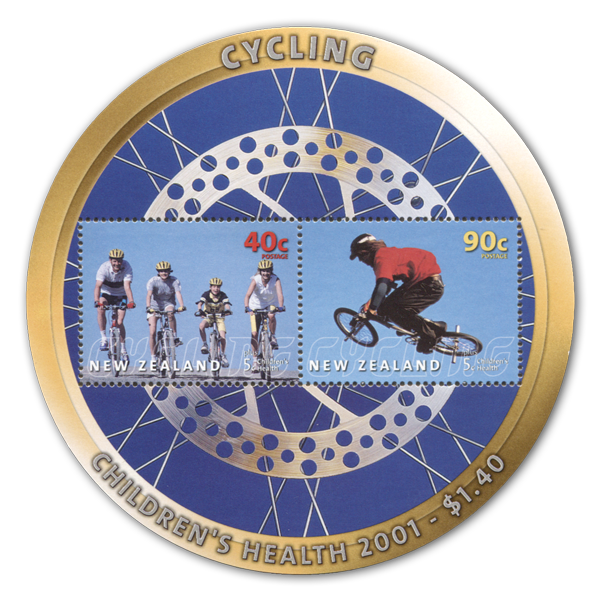 |
Miniature Sheet | Mint, used or cancelled miniature sheet. | $1.40 |
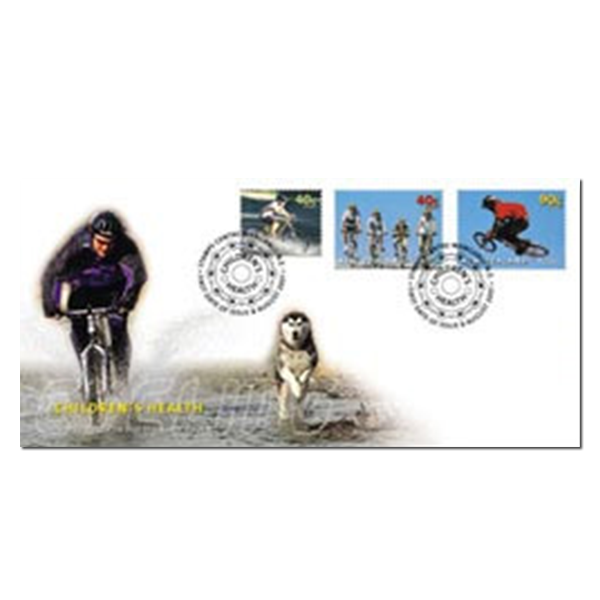 |
First Day Cover | First day cover with two gummed stamps and one self-adhesive stamp affixed. Cancelled on the first day of issue. | $2.35 |
 |
Set of First Day Covers | Set of seven first day covers with two gummed and one self-adhesive stamp affixed. Each first day cover cancelled with a unique postmark on the first day of issue. Limited to 1000 sets. | $39.50 |
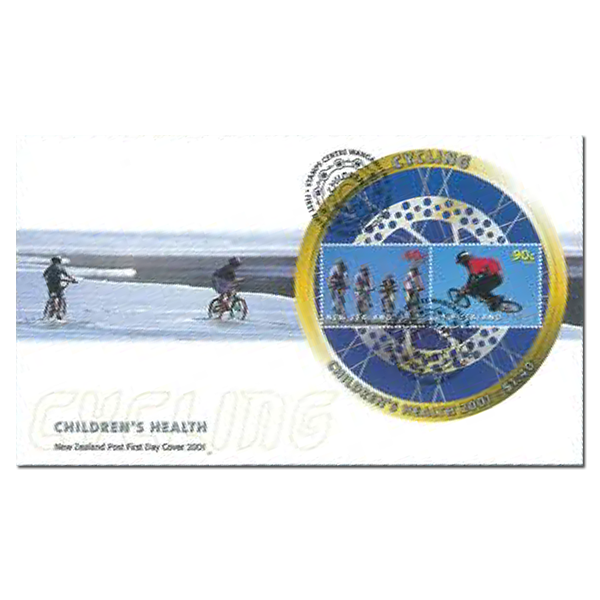 |
Miniature Sheet First Day Cover | First day cover with miniature sheet affixed. Cancelled on the first day of issue. | $1.90 |
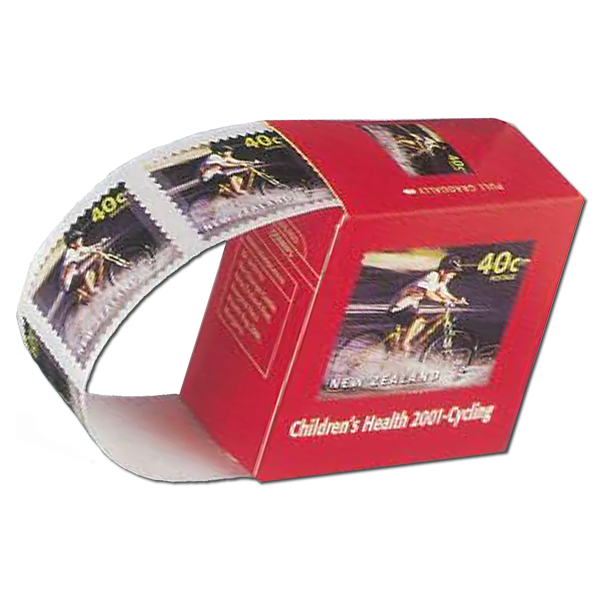 |
Self-adhesive Dispenser | Dispenser box containing 100 x 45c self-adhesive stamps. | $45.00 |
Technical information
| Date of issue: | 1 August 2001 |
|---|---|
| Number of stamps: | Two gummed and one self-adhesive stamp |
| Denominations and designs: | Gummed: 40c + 5c Family Time, 90c + 5c Catching Air; Self-adhesive: 40c + 5c Out Riding |
| Miniature sheet and first day covers designed by: | Comm Arts Design, Wellington, New Zealand |
| Printer and process: | Southern Colour Print, Dunedin, New Zealand by offset lithography |
| Number of colours: | Four |
| First day cover size: | 102mm x 206mm |
| Miniature sheet first day cover size: | 120mm X 206mm |
| Stamp size and format: | Gummed: 30mm x 40mm (horizontal); Self-adhesive: 25mm x 30mm (horizontal) |
| Sheetlet: | 180mm x 110mm (vertical) |
| Paper type: | Gummed: De la Rue 103gsm red phosphor coated stamp paper; Self-adhesive: JAC stamp non detection PS1 B90 paper |
| Number of stamps per sheet: | 50 |
| Perforation gauge: | 14 x 14 |
| Special blocks: | Plate/imprint blocks could be obtained by purchasing at least six stamps from a sheet. Barcode, value and logo blocks could be obtained by purchasing at least two stamps from a sheet. Barcode blocks were available in A and B format. |
| Period of sale: | These stamps remained on sale until 31 July 2002. |

